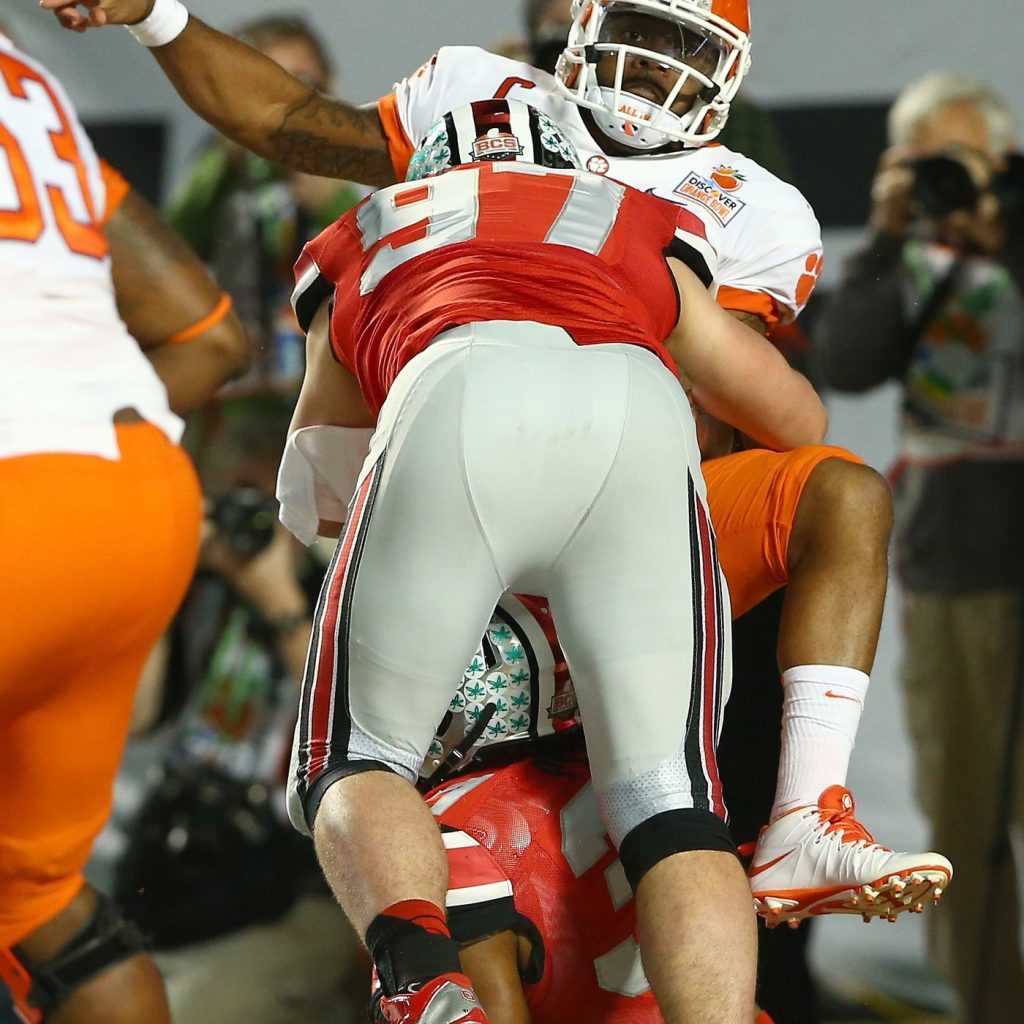In the game of football, “what is grounding football”refers to a penalty that occurs when the quarterback intentionally throws an incomplete pass to avoid being tackled or to prevent a potential interception. Understanding the rules and implications of grounding is crucial for both players and fans of the game.

Whats grounding in football?
Definition of grounding
Grounding in football occurs when the quarterback intentionally throws an incomplete pass by intentionally throwing the ball out of bounds, into the ground, or in an area where there are no eligible receivers, to avoid getting tackled or to prevent a potential interception.
The purpose of grounding rules
The purpose of grounding rules is to ensure that quarterbacks make legitimate attempts to complete a pass, promoting fairness and maintaining the integrity of the game. These rules prevent quarterbacks from exploiting the passing game by simply throwing the ball away whenever they are faced with pressure from the defense.
How officials determine grounding
Determining grounding involves the judgment of the officials on the field. The presence of eligible receivers, the location of the throw, and the quarterback’s intent are factors considered to determine if grounding has occurred. Officials have the discretion to make a judgment call based on their observations of the play.

The Rules and Penalties Associated with Grounding
Rule 8, Section 2, Article 1: The passer and the act of passing
Rule 8, Section 2, Article 1 of the NFL rulebook specifically addresses grounding and provides provisions for intentional grounding explained. According to this rule, a passer can not intentionally grounde the ball to conserve time or avoid a potential sack.
The criteria for determining intentional grounding include the presence of eligible receivers in the area of the pass and whether the passer is outside of the tackle box when the ball is thrown. If the quarterback does not meet these criteria and intentionally throws an incomplete pass, intentional grounding may be called.
Penalties for intentional grounding
The penalties include:
- Yardage loss: The offensive team loses yardage from the spot of the foul. Typically, the loss is around 10 yards, varying depending on the league and level of play.
- Loss of down: In addition to the yardage loss, the offensive team also loses a down. This means that they will have one fewer opportunity to gain the necessary yardage to continue the drive.
- Safety implications: In certain cases, intentional grounding may result in a safety if the quarterback throws the ball from within their own end zone. This occurs when the penalty is called in a situation where the quarterback is entirely in the end zone and throws the ball away to avoid being tackled for a safety.
-
Potential for intentional grounding to be a judgment call by officials: It is important to note that intentional grounding can be a judgment call by officials, as they must consider the context of the play and make a determination based on the rules and their observations.

Importance of Grounding in Football
The role of grounding rules in maintaining fairness
Grounding rules in football play a crucial role in maintaining fairness within the game. These rules ensure that quarterbacks cannot take advantage of certain situations by intentionally throwing the ball away without making a genuine attempt to complete a pass. By enforcing grounding rules, the game remains fair by promoting legitimate passing plays and preventing quarterbacks from exploiting the rules for their advantage.
In addition, grounding rules also prevent teams from gaining an unfair advantage by avoiding potential negative outcomes, such as sacks or interceptions.
Protecting the integrity of the game and its competitiveness
Grounding rules also play a vital role in protecting the integrity of the game and maintaining its competitiveness. Without these rules, quarterbacks would have the ability to simply throw the ball away whenever they were faced with pressure from the defense, effectively eliminating the efforts of the defenders.
By enforcing the grounding rules, officials ensure that quarterbacks must make genuine attempts to complete passes. This creates a more competitive environment where defenses can effectively pressure the quarterback and attempt to disrupt the passing game.
Ensuring the safety of the quarterbacks and other players
Another important aspect of grounding rules is the emphasis on player safety, particularly for the quarterbacks. Grounding rules discourage quarterbacks from recklessly throwing the ball away to avoid potential hits or sacks. By requiring quarterbacks to make a genuine attempt to complete a pass, the rules help protect them from unnecessary contact or injuries caused by haphazard throws.
Additionally, grounding rules also indirectly contribute to the safety of other players on the field.

Practicing grounding under pressure situations
In football, grounding refers to a situation where the quarterback throws the ball away intentionally, and it doesn’t reach a receiver or go out of bounds before reaching the line of scrimmage. This usually happens under pressure when the quarterback avoids a sack or doesn’t have a good throwing opportunity.
There’s actually been some discussion about potentially changing the grounding rule for the 2024 season. Currently, a lot hinges on whether the quarterback is considered “in the pocket” or not when throwing the ball away. Practicing grounding under pressure situations is a common drill for quarterbacks to work on their decision-making and throwing mechanics when faced with a collapsing pocket or a lack of open receivers.
NFL rules and regulations regarding grounding
The NFL rulebook defines intentional grounding as a situation where:
-
The Passer Faces Pressure: The quarterback must be facing “imminent loss of yardage” due to pressure from the defense. If the passer has time and a receiver isn’t running the expected route, it’s not intentional grounding.
-
The Throw Has No Chance: There must be “no realistic chance of completion” for the pass. This means throwing the ball out of bounds past the line of scrimmage with no receivers in the area.

Enhancing offensive game plans and play calling
t happens when a passer, typically the quarterback, throws the ball forward without a realistic chance of a teammate catching it. There are two key aspects to intentional grounding:
- Avoiding a Sack: The quarterback must be under pressure from the defense and facing a significant loss of yardage (a sack) when they throw the ball.
- No Realistic Completion: The throw must be towards an area of the field where no eligible receiver has a chance to catch it.
Here’s how grounding impacts offensive game plans and play calling:
-
Risky Strategy: It’s a risky decision for a quarterback to choose intentional grounding because it results in a 10-yard penalty and a loss of down. This can stall offensive momentum and hurt your chances of scoring.
-
Strategic Tool (Limited): In some situations. Throwing the ball away intentionally might be preferable to taking a sack and potentially fumbling the ball. However, coaches will generally discourage quarterbacks from relying on this strategy.
-
Play Design: Offensive plays are designed with routes for receivers to get open. By calling plays with good passing options, quarterbacks can minimize the risk of intentional grounding penalties.
-
Quarterback Awareness: A good quarterback needs to be aware of pressure from the defense and make quick decisions. They should look for open receivers or scramble to avoid a sack before resorting to throwing the ball away.
In conclusion, grounding (intentional grounding) is a penalty that limits offensive options. While it can be a necessary evil in some situations. Good offensive game plans and play calling should minimize its use.
Strategies to Avoid Grounding
Proper pocket presence and field awareness
One effective strategy to avoid grounding is for quarterbacks to maintain strong pocket presence and be aware of their surroundings on the field. By keeping their eyes downfield, quarterbacks can identify eligible receivers and make appropriate throwing decisions, minimizing the chances of grounding.
Using appropriate throwing techniques
Using proper throwing techniques can also help quarterbacks avoid grounding penalties. This includes stepping up in the pocket, utilizing proper footwork, and maintaining a good throwing posture. These fundamentals can improve accuracy and increase the likelihood of completing passes to eligible receivers.
Communication with receivers and offensive linemen
Effective communication with receivers and offensive linemen is essential in avoiding grounding penalties. This reduces the chances of miscommunications that could lead to grounding.
In conclusion, grounding rules in football are crucial for maintaining fairness, protecting the integrity of the game. And ensuring player safety. These rules prevent quarterbacks from exploiting the passing game and provide a more level playing field for both offensive and defensive units. By employing strategies such as proper pocket presence, appropriate throwing techniques, and effective communication. Quarterbacks can minimize the risk of grounding and optimize their passing game. Ultimately, the enforcement of grounding rules contributes to the overall balance and enjoyment of football as a competitive sport.
